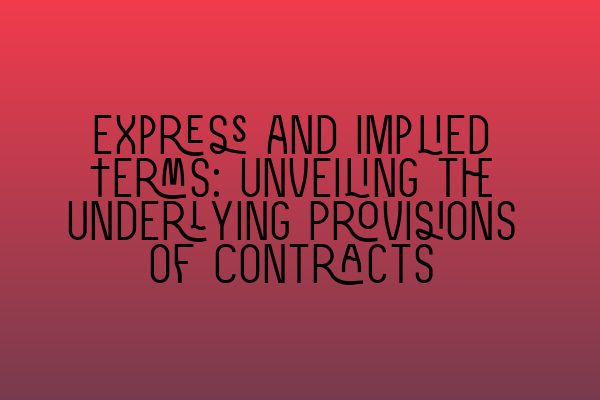Express and Implied Terms: Unveiling the Underlying Provisions of Contracts
In the realm of contract law, there are two fundamental types of terms that govern the rights and obligations of parties involved: express terms and implied terms. Understanding the intricacies of these terms is crucial for both solicitors and individuals entering into contracts.
Express Terms
Express terms are provisions that are explicitly stated in a contract. These terms can be in writing, spoken, or even inferred from conduct. They establish the rights and responsibilities of the parties involved and serve as the backbone of any contractual agreement.
When drafting a contract, solicitors have the responsibility to ensure that all essential terms are clearly expressed. Express terms can cover a wide range of subjects, including the price, delivery obligations, and payment terms. It is essential to define these terms accurately and precisely to avoid ambiguity and potential disputes in the future.
Implied Terms
Implied terms, on the other hand, are not explicitly stated in a contract but are nonetheless deemed to exist due to legal principles, customs, or the nature of the agreement. These terms are typically inferred by the courts to give effect to the parties’ intentions and to fill in any gaps that may exist in the contract.
There are two types of implied terms: terms implied by law and terms implied by fact. Terms implied by law, also known as statutory implied terms, are automatically included in certain types of contracts based on legislation or common law. These terms are deemed necessary for the contract to be enforceable and to protect the parties’ interests.
Terms implied by fact, on the other hand, arise when the court infers that certain provisions are necessary to give business efficacy to the contract or to reflect the parties’ actual intentions. These terms are generally implied to promote fairness and reasonableness in contractual relationships.
How to Determine Implied Terms
Determining whether or not a term is implied requires careful analysis of the circumstances surrounding the contract. The courts will consider several factors, including the nature of the contract, the intentions of the parties, the industry customs, and any relevant legislation.
Courts will also examine the parties’ conduct before and after the formation of the contract to determine the existence of any implied terms. For example, if a contract is silent on delivery timelines, but the parties have consistently delivered goods within a specific timeframe in the past, a court may infer that delivery within that timeframe is an implied term.
Enforceability of Implied Terms
The enforceability of implied terms depends on their nature and the specific circumstances of the contract. While some implied terms are considered essential and are therefore included automatically, others may be excluded or modified through express terms.
It is also worth noting that some terms may be implied by law and cannot be excluded or modified by either party. These terms are often designed to protect the weaker party in contracts, such as consumers or employees.
Conclusion
Understanding and recognizing the difference between express and implied terms is crucial for anyone involved in contract law. Express terms provide clarity and certainty, while implied terms fill in gaps and ensure fairness in contractual relationships.
As a solicitor, it is vital to draft contracts that clearly express the parties’ intentions and obligations. By doing so, you can minimize the risk of future disputes and ensure that your clients’ interests are protected.
For more insights into the legal field and becoming a solicitor, check out these related articles:
– Exploring Solicitor Salaries in the UK: Average Earnings and Factors Affecting Income
– Securing Training Contracts: A Roadmap to Becoming a Solicitor
– Mentorship for Aspiring Solicitors: Nurturing Talent in the Legal Field
– Legal Challenges and Pitfalls: Navigating the Complexities of the Legal System
– The GDL (Graduate Diploma in Law): A Pathway to Becoming a Solicitor
Remember, a well-drafted contract with clear express terms and necessary implied terms can lay the foundation for a successful business relationship. Don’t underestimate the importance of understanding and including both types of terms in your contracts.
